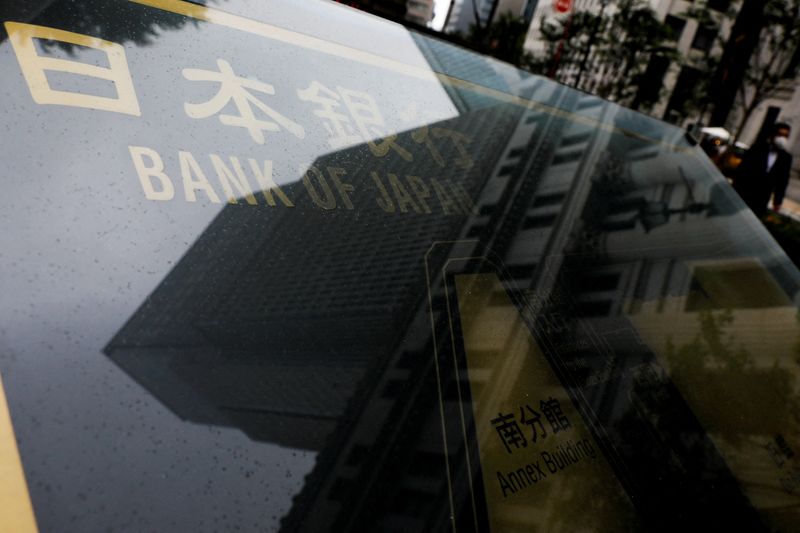BOJ to keep ultra-low rates, hold fire until global outlook clearer
2022.12.14 23:37
[ad_1]

© Reuters. FILE PHOTO: A view of signage outside the headquarters of Bank of Japan in Tokyo, Japan, May 22, 2020. REUTERS/Kim Kyung-Hoon
By Leika Kihara
TOKYO (Reuters) – The Bank of Japan is set to keep ultra-low interest rates and dovish guidance next week, signalling its resolve to hold off on withdrawing stimulus until it clearly sees that the economy can withstand a hit from slowing global growth.
The decision will follow the U.S. Federal Reserve’s latest interest rate hike on Wednesday and cement the BOJ’s status as a dovish outlier as a wave of counterparts continue tightening monetary policy to combat soaring inflation.
With Japan’s economy still only beginning to recover from the coronavirus pandemic’s pain, BOJ Governor Haruhiko Kuroda has stressed the need to keep policy ultra-loose.
At a two-day meeting ending on Tuesday, Dec. 20, the BOJ is widely expected to maintain a -0.1% target for short-term rates and a 0% cap for the 10-year bond yield, both set under its yield curve control (YCC) policy.
Investors are focusing on Kuroda’s post-meeting briefing for clues on the policy outlook. Markets are rife with speculation that the BOJ will adjust its policy when Kuroda’s second, five-year term ends in April.
“While the BOJ likely won’t change policy next week, markets will look for any change in how the bank describes the outlook for prices, as inflation may stay around its 2% target well into next year,” said Izuru Kato, chief economist at Totan Research.
“If the U.S. economy averts a deep recession and Japan’s economy is in fairly good shape, the BOJ may remove its yield cap around June or July next year,” he said.
Since inflation is above the target and there is some prospect of wages increasing, BOJ officials are already beginning to drop signs of a possible change to YCC next year.
The BOJ should review its monetary policy framework and adjust its massive stimulus programme after considering the outcome of a round of wage talks next year, board member Naoki Tamura told the Asahi daily, giving a sign of growing focus on the drawbacks of prolonged easy policy.
The idea has been embraced by some in the central bank, say three sources familiar with its thinking.
While BOJ officials do not rule out the chance of a policy adjustment next year, they are in no rush, because an expected slump in global growth is seen weighing on exports, the sources say.
Many in the BOJ also prefer to look at the outcome of the wage talks, called “shunto”, in determining how quickly the central bank can phase out stimulus, they say. The shunto talks will be held between blue-chip firms and unions around March.
“If wage growth turns out to be strong, the BOJ will then assess whether that strength can be sustained,” one of the sources said, expressing a view echoed by two others.
CONTENT WITH STATUS QUO
Amid uncertainty over the global outlook and pace of Japanese wage rises, the BOJ is content with maintaining the status quo for now, the sources said.
Japan’s core consumer prices in October were 3.6% higher than a year earlier, exceeding the BOJ’s inflation target for a seventh straight month and driven by soaring fuel and raw material costs.
The BOJ expects the inflation rate to slow below its target next year because cost pressure will dissipate.
But some analysts expect core consumer inflation to exceed 4% in coming months and stay around 2% for most of next year, as companies continue to pass rising costs on to households.
A survey by Teikoku Databank conducted in November showed major food and beverage makers planned to lift prices for more than 4,000 items next year, with the rises concentrated in February.
The hope among policymakers is for wages to increase enough next year to compensate households for the rising living costs, helping to turn cost-push inflation into inflation driven by demand.
Any chance of a BOJ policy adjustment will disappear if the Fed fails to tame inflation without pushing the U.S. economy into deep recession, analysts say.
“There’s a chance Japan’s inflation may keep accelerating longer than expected next year,” said Yoshiki Shinke, chief economist at Dai-ichi Life Research Institute in Tokyo.
“But the BOJ will probably find it hard to phase out stimulus if the global economy is in bad shape,” he said.
[ad_2]
Source link








